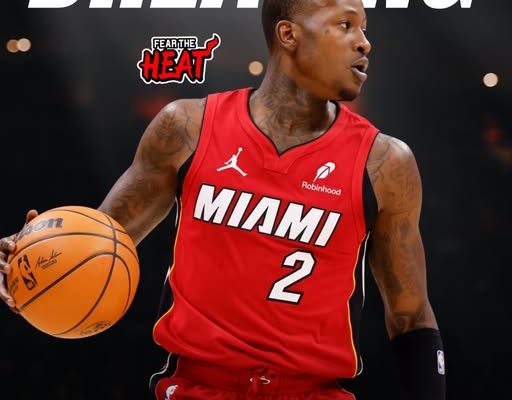When the Miami Heat traded for Terry Rozier in January 2024, sending Kyle Lowry and a future first-round pick to the Charlotte Hornets, it signaled a bold attempt to add scoring punch and a youthful veteran to a roster that desperately needed offensive rejuvenation. But the trade came with mixed reviews. Critics cited Rozier’s inefficiencies and questioned his fit next to Jimmy Butler and Bam Adebayo, while fans were eager to see if he could replicate the dynamic backcourt firepower he occasionally displayed in Charlotte and Boston. Yet as of July 2025, one year and a half into his tenure with the Heat, Terry Rozier is not only still in Miami but also represents a fascinating case study in roster stability, financial commitment, and strategic ambiguity. While other trade pieces have moved, and while the Heat continue to be linked to various blockbuster rumors, Rozier has remained.
The reality of the modern NBA is that rosters are more fluid than ever. Stars move frequently, role players are often treated like chess pieces in pursuit of financial flexibility, and the trade deadline has become an annual frenzy of speculation and shifting allegiances. So, when a player like Rozier—who seemed likely to be moved, or at least floated in trade rumors—stays with the same team beyond a full calendar year, it invites deeper examination. Why is Terry Rozier still on the Miami Heat? What does this mean for their future direction, and how does his presence reflect on Pat Riley’s front office philosophy? More importantly, what does Rozier’s career arc, from Boston’s “Scary Terry” playoff breakout to Charlotte’s scoring centerpiece to Miami’s offensive wildcard, teach us about player value and team building in today’s league?
To understand Rozier’s place in Miami, it’s important to trace the evolution of his career. Drafted 16th overall in 2015 by the Boston Celtics, Rozier spent his early years as a backup to Isaiah Thomas and later Kyrie Irving. But it wasn’t until the 2018 playoffs that Rozier truly burst onto the national stage, stepping up in Irving’s absence and helping lead the Celtics to the Eastern Conference Finals. His blend of fearlessness, defensive toughness, and clutch shot-making earned him the nickname “Scary Terry,” and for a time, it looked like he might be the next breakout star in Boston. However, once Irving returned and the Celtics’ chemistry suffered in 2019, Rozier became expendable.
He signed with the Charlotte Hornets that summer via sign-and-trade, part of the domino effect that sent Kemba Walker to Boston. Many scoffed at Rozier’s contract at the time—three years, \$58 million—viewing him as overpaid for his resume. But in Charlotte, Rozier thrived as both a scorer and leader. Over multiple seasons, he averaged upwards of 20 points per game, improved his three-point shooting, and even carried stretches of offense when LaMelo Ball was injured or inconsistent. While the Hornets remained mired in mediocrity, Rozier’s value as a proven scorer on a non-playoff team became increasingly clear.
That’s where Miami came in. The Heat were struggling with offensive production, ranking among the lowest-scoring teams in the NBA despite having Jimmy Butler and Bam Adebayo. With Lowry aging and losing his effectiveness, Miami needed a spark. Rozier provided that spark in theory: a combo guard capable of heating up in a hurry, running pick-and-rolls, spacing the floor, and creating his own shot. But the results were uneven. While Rozier had moments of brilliance—including games where he scored over 25 or hit big fourth-quarter shots—he struggled with consistency, shot selection, and sometimes fit awkwardly into Erik Spoelstra’s structured, defense-first system.
Still, the Heat stayed competitive. They made the playoffs again in 2024, and Rozier played a supporting role, though it was clear that Butler, Adebayo, and Tyler Herro remained the focal points. The question then shifted to the offseason: would Miami flip Rozier for a bigger piece? Would he be part of a trade for a star like Donovan Mitchell or Damian Lillard, both of whom had been linked to the Heat in trade rumors? Would Pat Riley cash in Rozier’s contract as salary ballast in a bigger deal?
None of that happened. And now, heading into the 2025-26 season, Rozier is still on the team. On paper, that might seem underwhelming. But it’s important to understand that his continued presence isn’t a failure—it’s a reflection of both league-wide trade dynamics and Miami’s internal evaluation.
From a financial standpoint, Rozier’s contract is relatively team-friendly for a veteran guard. He is earning roughly \$25 million per year, which, in the context of a rising salary cap and ballooning superstar contracts, is not unreasonable. More crucially, Rozier is still productive. He averaged 17.8 points per game in the 2024-25 season, along with 4.1 assists and 3.2 rebounds. His three-point shooting hovered around 36%, and he played roughly 31 minutes per night. These are not All-Star numbers, but they’re respectable and, for a team like Miami that values depth and reliability, valuable.
Additionally, Rozier has embraced a quieter role in Miami. In Charlotte, he was expected to carry the offense. In Boston, he was fighting for minutes. In Miami, he operates in between—he’s not the main guy, but he’s not forgotten. He’s the type of player who can go off for 30 on a Tuesday night against the Pacers but will also accept a quieter 8-point, 5-assist game in a tough defensive battle. That willingness to shift roles, to sacrifice ego for the greater good, is part of the Heat culture. And it’s part of why he’s still on the roster.
Rozier’s attitude and work ethic also fit seamlessly with what Miami expects. This is a franchise built on grinding. It’s not for the glamorous or the stat-chasers. From Udonis Haslem’s legacy to Jimmy Butler’s mantra of “Playoff Jimmy,” the Heat thrive on players who show up when it counts. Rozier’s mental toughness, born from his rough upbringing in Youngstown, Ohio, and his willingness to battle through slumps or criticism, has not gone unnoticed.
But there’s also the strategic side of keeping Rozier. With the new collective bargaining agreement imposing stricter penalties for high-spending teams, flexibility is more important than ever. Miami, always looking to stay beneath the second tax apron, needs contracts like Rozier’s to balance the books in any future deal. Having him on the roster isn’t just about what he provides on the court—it’s about what he enables them to do off the court. If a star becomes available and the Heat need to cobble together matching salary, Rozier’s deal is ideal. He’s paid enough to be included in a trade for a max-caliber player, but not so much that he’s unmovable. He’s a plug-and-play piece in any future transaction.
Moreover, the trade market for guards has cooled. With teams more cautious about spending and less eager to trade young assets, there hasn’t been the kind of widespread interest in scoring guards like Rozier as in years past. The league is also flooded with combo guards—so unless Rozier dramatically elevates his play or unless injuries spark demand, there’s no clear path for an overpay in a trade. In short, Miami likely didn’t receive offers they felt justified letting him go.
And so Rozier remains. And this, in itself, offers a rare bit of continuity in a league defined by constant change. For the Heat, keeping Rozier is a bet on internal improvement, on a team that made the Finals just two years ago and still believes it can contend. It’s a sign that sometimes the best move is not the most dramatic one, but the most calculated. Rather than chasing headlines, Miami is building a stable core around Butler, Adebayo, Herro, and Rozier, hoping that chemistry and experience will win out.
As for Rozier, his journey is far from over. At 30 years old, he’s still in his prime, still capable of surprising opponents with his quickness, handles, and fearless shot-making. He’s no longer the breakout star or the misfit scorer. He’s a seasoned pro, battle-tested, and trusted by one of the league’s most respected franchises.
Whether he stays in Miami beyond this upcoming season is unknown. Maybe he finally becomes the trade piece in a blockbuster. Maybe he signs an extension and becomes a long-term piece. Or maybe he becomes the kind of journeyman that every contender covets—someone who can adapt to different roles, elevate his game in big moments, and never complain about usage or minutes.
But for now, Rozier is still in Miami. And that means something. It means he’s earned trust. It means he’s carved out a role. And it means that even in a league that often treats players like assets, there’s still room for consistency, loyalty, and belief in a player’s long-term value.
So, while the headlines may scream about the next superstar trade, and while fans debate whether Miami should blow it up or go all in, Terry Rozier quietly prepares for another season in Heat culture. He’ll train, study film, grind through practices, and wait for his moments. Because that’s who he is. And that’s what the Heat saw when they brought him in—not just a scorer or a salary figure, but a competitor. One who’s still standing in Miami, for all the right reasons.



